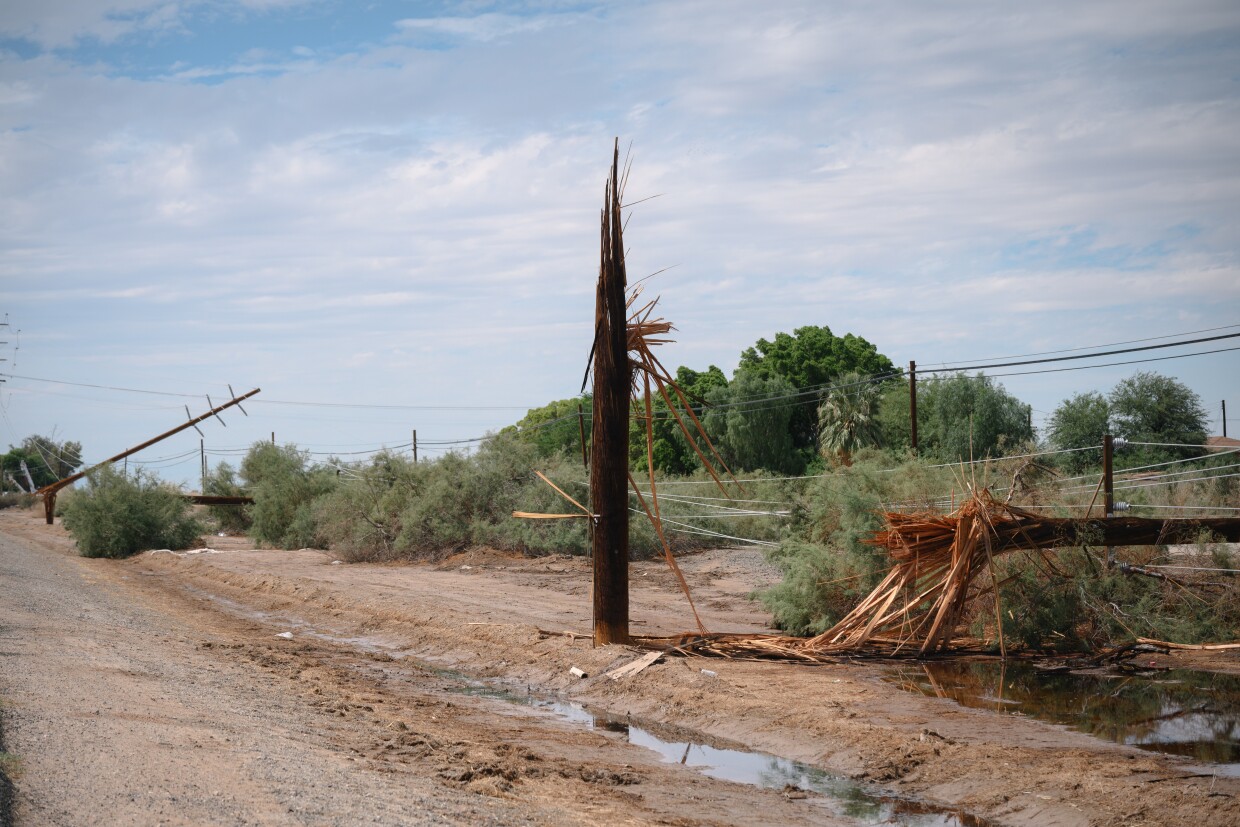The Trump administration has cancelled $18 million in federal funding for a sorely needed effort by the Imperial Irrigation District (IID) to overhaul its aging electrical grid and make it more resilient to storm damage.
The decision, handed down earlier this month, means rural Imperial Valley communities who rely on the public utility for power could continue to face prolonged outages after major storms. The withdrawn federal dollars made up half of the agency’s funding for the planned $37 million in upgrades.
Last week, IID officials tried to reassure customers, pledging to move ahead with those upgrades despite the cuts. But in a statement, IID Power Manager Matt Smelser admitted that the agency would need to reassess the scope of the project.
“We’ll be trimming the original plan a bit, but we will be fully implementing its core components,” Smelser said.
IID is the sixth-largest power utility in California and supplies electricity to 160,000 customers across Imperial County and a swath of Riverside County. The agency is also a regional water provider.
The planned upgrades, known as an Advanced Distribution Management System (ADMS), would make it easier for IID to track down outages and restore power to customers after storms, especially in remote areas.
Those upgrades would also lay the groundwork for adding more renewable energy resources to the grid.
The Trump administration’s decision to revoke funding for the project was part of a broader effort to cancel federal spending on infrastructure projects tied to renewable energy. Officials have also targeted funding for battery manufacturing plants in Kentucky and power lines in the Great Plains region.
A U.S. Department of Energy spokesperson did not answer specific questions from KPBS about their decision to withdraw the funding. In a statement last week, they said the department had closely reviewed the project and found it “failed to meet the standards required to justify continued taxpayer investment.”
“President Trump promised to make government more accountable and efficient,” wrote Olivia Tinari, a spokesperson for U.S. Energy Secretary Chris Wright. “Secretary Wright’s actions deliver on that promise.”
IID’s planned upgrades were originally funded by the Bipartisan Infrastructure Bill passed by Congress four years ago under President Joe Biden.
Currently, the utility often can’t detect when their power delivery systems fail in remote areas. In an August interview prior to the Trump administration’s announcement, IID spokesperson Robert Schettler said their only way to identify some of those outages is for customers to call and report them.
“Unless they call us, we don't know,” Schettler told KPBS at the time. “The ADMS is going to really help with that.”
This year, several punishing monsoon storms have laid bare those vulnerabilities. One storm in late August toppled power poles across the region and knocked out power to at least 6,000 customers.
In a desert region like the Imperial Valley, a power outage can be a life-or-death situation. Daytime temperatures regularly soar above 100 degrees during the summer months, making fans and air conditioning essential resources for everyday life.
In a statement celebrating the initial federal funding award last October, U.S. Senator Alex Padilla (D-Calif.) said IID’s project would bolster energy resilience and reliability in Southern California.
“Modernizing and strengthening the electrical grid is essential, especially amid increasingly extreme heat and rising energy needs in the Imperial and Coachella valleys,” Padilla said.
Although the Trump administration has not said specifically why it revoked the funding, it could be due to IID’s focus on improving service for disadvantaged and “economically challenged” communities, according to reporting by the news outlet Politico.
The White House has increasingly moved to undo federal environmental justice efforts meant to protect poor people and communities of color from pollution and other hazards. Imperial County is a majority Latino region and one of the poorest corners of California.
Still, in a statement, IID Board Chair Gina Dockstader said the utility remained committed to the project.
“We stand up to take the project on ourselves because it’s the right thing to do for our customers, for our communities, and for our future,” Dockstader said. “We will find a way.”







